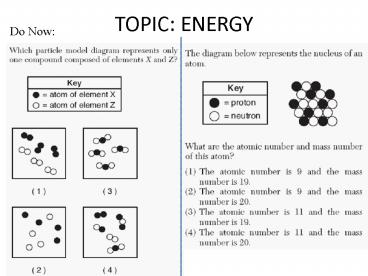TOPIC: ENERGY - PowerPoint PPT Presentation
Title:
TOPIC: ENERGY
Description:
TOPIC: ENERGY Do Now: All physical & chemical changes are accompanied by change in energy The chemistry of energy changes is known as Thermochemistry! – PowerPoint PPT presentation
Number of Views:89
Avg rating:3.0/5.0
Title: TOPIC: ENERGY
1
TOPIC ENERGY
Do Now
2
All physical chemical changes are accompanied
by change in energy
- The chemistry of energy changes is known as
Thermochemistry!
3
Stability and Energy
- If energy is high, stability is low
- If energy is low, stability is high
4
Energy Ability to do WorkThe SI unit for an
energy measurement is called the Joule
(J)EXAMPLE 1 Joule amount of energy required
to lift a golf ball 1 meter
5
Law of Conservation of Energy
- Energy is neither created nor destroyed in
ordinary chemical or physical change, rather it
can be converted from one form to another
- potential to kinetic - radiant to electric -
electric to heat - chemical to kinetic -
chemical to electrical
Energy before Energy after
6
(No Transcript)
7
Kinetic Energy (KE) energy of motion
- KE ½ x Mass x Velocity2 ½ mV2
- KE depends on how heavy and how fast
Kinetic Molecular Theory the atoms and molecules
making up substances are in constant motion
8
Potential Energy (PE) energy of position stored
energy of matter
- EXAMPLES
- stapler
- Rubberband
9
- When Potential energy is released from matter it
becomes kinetic energy
10
Energy in Chemistrychemical energyheat energy
11
Chemical Energy
- energy stored in bonds it is released as the
result of a chemical reaction
12
Heat Energy
- Heat energy that is in the process of flowing
from warmer object to a cooler object - Symbol for heat energy Q or q
- The amount of heat required to raise the temp. of
1 gram of water 10C a calorie
13
- Other Energy Units
- calorie, Calorie, BTUs
- 1 calorie 4.18 Joules
- 1 Calorie 1000 calories 1 kilocalorie
- NOTE When your body breaks down food, these
reactions give off heat which is measured in
calories (Thats why your food is labelled in
calories)
14
energy (heat) is given off exothermic EXO -
energy leaves system (exits)
Temperature of environment ? Temperature of
system ?
15
energy (heat) is absorbed endothermicEndo -
Energy enters system (enter)
Temperature of environment ? Temperature of
system ?
16
Energy of Universe is conserved
- Universe
Energy can move between the system and the
environment
Environment
17
Calorimeter an insulated devise used for
measuring the amount of heat absorbed or released
during a chemical or physical change
18
- universe is contained in Styrofoam cup
- environment is water
- system is whatever put in water
- Energy lost Energy gained
- Difficult to monitor system
- Easy to monitor environment (water)
- Energy lost/gained by environment
- Energy gained/lost by system
19
The amount of heat transferred depends on 3 things
- Temperature change
- Mass of substance
- Specific Heat of substance
20
Specific Heat
Found in Table B
- The amount of heat required to raise the temp of
any given substance by 10C - Symbol c
- Specific heat a physical constant
- unique for each pure substance
21
Calculating Heat Transferred
- Simple system
- pure substance in single phase
- calculate heat gained or lost using
- Q mC?T
Q amount of heat transferred m mass of
substance C specific heat capacity of the
substance. ?T temperature change Tfinal
Tinitial
22
Calorimetry
- 10 grams of NaOH is dissolved in 100 g of water
the temperature of the water increases from 22?C
to 30?C - was dissolving process endothermic or exothermic
- how do you know?
Exothermic temperature of environment ?
23
Dissolving
- Whats happening when NaOH dissolves?
molecules close together, not interacting
molecules pulled apart interacting with H2O
24
Calorimetry
- Calculate energy released by NaOH as it dissolves
in water - Energy lost by NaOH Energy gained by water
Easier to calculate from H2O perspective
25
Calorimetry Q mC?T
- temperature of water increased from 22?C to 30?C
- 30?C -22?C 8?C ?T
- What mass to use? Well, temp change was for
water, so want mass of water m 100 g - Same goes for specific heat capacity calculate
heat absorbed by water - cH20 4.18J/g?
26
Q mC?T
- Q (100 g)(4.18 J/g?)(8?C)
- Q 3344 Joules































